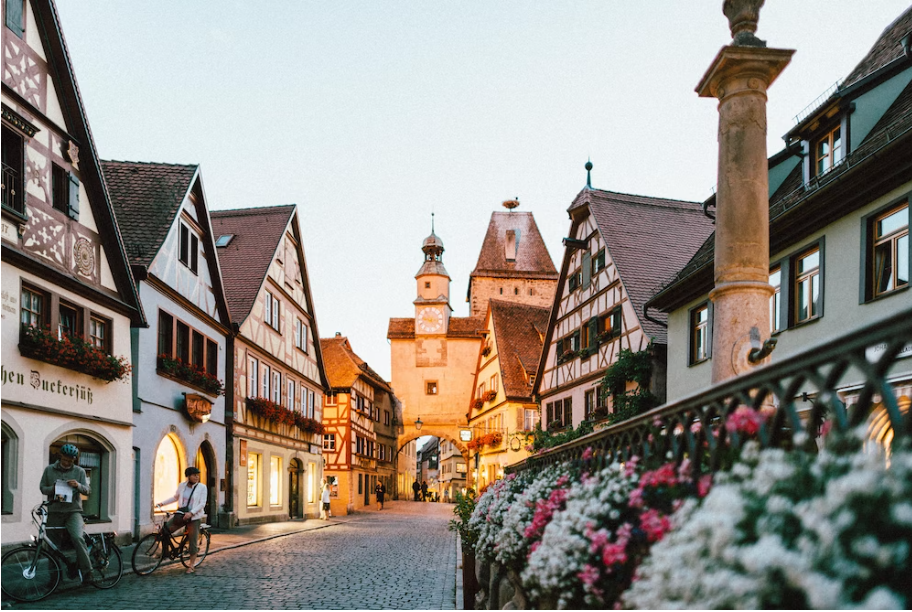
Are you planning to go to Germany? If so, it’s completely understandable that you might not be willing to learn a whole phrasebook to communicate with the locals. However, they don’t necessarily know English – and you might often need to win them over, especially when talking to older people.
Moreover, do you know that German is one of the most widely spoken languages in Europe? You can find German native speakers not only in Germany but also in Austria, Switzerland, Austria, Liechtenstein, and Luxembourg.
Can you get around without knowing the German language? We say that it’s definitely possible – especially if you know some basic German vocabulary or common German phrases. Of course, knowledge of German grammar will also be beneficial, but sometimes, you simply might not have time to master it.
In the article below, you will find the 100 basic German phrases and words that might help you during your trip. Learn how to use and pronounce them and make sure that you can speak German without really knowing it.
Pronunciation Basics
Many sounds in the German language differ from those in English, and it can be really easy to mix them up and say something inappropriate. To avoid that, check our short pronunciation guide – we are sure that it will help you communicate better with native German speakers.
- ai/ei/ay = i (as in cry)
- i/ie = e (as in see)
- ö as u in turn (but without the r)
- ü as in lure (there’s no exact equivalent in English)
- ä = a (as in say (without e-sound)
- au = ou (as in loud)
- äu/eu = oy (as in boy)
- s = z (as in zone)
- sch = sh (as in shoe)
- sp and st = shp and shtß = s (as in boss)
- z = ts (as in pizza)
- w = v (as in vine; English w-sound does not exist in German)
The List Of 100 Basic German Words
Below, you will find the list of the 100 basic German phrases and necessary words that might help you communicate with native speakers. However, as you use them, please be careful with pronunciation and context so as not to confuse the person you’re talking to. At the end of the article, you will also find a few paragraphs explaining when and how to use some of the most common German words.
Native
Translation
erklären
to explain
telefonieren
to phone
wandern
to hike
sitzen
to sit
stehen
to stand
bleiben
to stay
Die Toilette
The toilet
Die Hilfe
The help
Der Arzt
The physician
krank
sick
Das Krankenhaus
The hospital
Der Strand
The beach
Das Meer
The sea
Der Berg
The mountain
Der Urlaub
The holiday
Der Mensch
The human
Der Schnee
The snow
Das Eis
The ice
Der Eiswürfel
The ice cube
Die Uhr
The watch
Der Garten
The garden
Das Schild
The street sign
Der Mann
The man
Die Frau
The woman
Das Kind
The child
prost!
Cheers!
Das Bier
The beer
Der Wein
The wine
Der Alkohol
The alcohol
Der Norden
The North
Der Osten
The East
Der Süden
The South
Der Westen
The West
Die Straße
The street
Die Kreuzung
The crossroad
Das Haus
The house
Der Baum
The tree
Der Park
The park
hässlich
ugly
angenehm
comfortable
laut
loud
leise
quiet
vorne
front
hinten
behind
oben
on top, above
unten
below, down
fahren
to drive
laufen
to walk
sehen
to see
hören
to hear
Die Zeit
The time
Die Stunde
The hour
Die Minute
The minute
Die Sekunde
The second
Der Tag
The day
Die Nacht
The night
heute
today
morgen
tomorrow
Der Morgen
The morning
Der Abend
The evening
früh
early
spät
late
kalt
cold
heiß
hot
gut
good
schlecht
bad
nett
nice
schön
beautiful
hübsch
pretty
hallo
Hello
Hitschüss
Bye
Entschuldigung
Sorry
Danke
Thanks
Bitte
You’re welcome
Die Liebe
The love
Das Hotel
The Hote
Das Zimmer
The room
Das Auto
The car
Das Glas
The glass
Die Flasche
The bottle
Das Essen
The food
Das Getränk
The drink
essen
to eat
trinken
to drink
gehen
to go
zu schauen
to watch
rennen
to run
fliegen
to fly
reden
to talks
prechen
to speak
Das Fahrrad
The bicycle
Der Bus
The bus
Der Zug
The train
Das Flugzeug
The airplane
Der Bahnhof
The train station
Der Flughafen
The airport
Die Rechnung
The bill
Das Geld
The money
Das Wasser
The water
Basic German Phrases
Of course, knowing some words in the German language might not be enough. A few helpful German phrases can make the communication with the native speakers much easier – and aid you in making new friends. Here are some of them:
- Es tut mir leid – I’m sorry.
- Entschuldigen Sie – Excuse me.
- Können Sie mir helfen? – Can you help me?
- Wie heißen Sie? – What’s your name? (formal)
- Wie heißt du? – What’s your name? (informal)
- Ich heiße… – My name is…
- Ich komme aus… – I’m from…
- Wie alt sind Sie? – How old are you?
- Wie geht es dir? – How are you? (casual)
- Wie geht es Ihnen? – How are you? (formal)
- Gut, danke – Fine, thank you.
- Nett, Sie kennen zu lernen – Nice to meet you.
- Was ist das? – What is this?
Further Explanations
While those are the most basic German phrases that will help you during a conversation with a German person who doesn’t speak English, they still can be tricky when used beyond the context. So, to make your life easier, here are some explanations that will help you master those common German words and maybe even improve your language learning process.
Hello
There are several ways how to say hello. “Hallo” is the most common one – but a lot of German-speaking people also use the word “hi” as in English, with the same pronunciation. A more formal way would be “guten Tag” (good day), “guten morgen” (good morning), or “guten abend” (good evening).
Depending on the area you will be in, they will probably have other words for hello, like “grüß Gott,” “servus,” “moin,” or even just “na.” The use of the words would also depend on the age of the person you’re talking to.
Tschüss
There are also several ways to say “bye” in German. A formal way would be “auf Wiedersehen” which means “see you again.” The word “später” basically means “later,” yet in German, most of the time, it refers to the same day. So if you want to say “see you later,” which is “bis später,” keep in mind that you’d mean “the same day.”
If you don’t refer your “see you later” to the same day, you can say “bis dann.” Other than that, there are phrases like “bis morgen” (see you tomorrow), “bis [day of the week],” “bis bald” (see you soon), “bis gleich” (see you on a bit), “bis die Tage” (see you within the next few days), and many more of those “bis”-phrases (“bis” literally means “until”).
If you want to say “farewell,” as in “I’ll never see you again,” you can say “leb’ wohl” ( literally “live well”).
Danke
That word would be the same as “thanks.” You can make it more polite by saying “danke dir/Ihnen” (thank you informal/formal), “danke sehr” (thanks a lot), or “vielen Dank” (thank you very much).
Entschuldigung
With this one word, you say two things: “sorry” and “excuse me.” When you ask someone something and want to start with “excuse me,” you’d use the same word as accidentally bumping into someone.
Bitte
Same here, one word for two meanings. Someone says “danke” (= thanks/thank you), you can reply with “bitter” (you’re welcome). You want to politely ask for something adding “please,” then you can do the same in German adding “bitter.”
Fahren
Whenever you take a vehicle (e.g., car), you use the word “fahren” (drive) in German. Even if you go by bus/bike/train, in German, you drive by bus/bike/train. “Ich fahre Auto” means “I drive cars.” “Ich fahre mit dem Auto” would mean “I will go by car.” So the difference wouldn’t be created by a different verb, but by adding the word “mit” (by) and the dative article (“dem,” “den” or “der”), which differentiate between “drive” and “go by.”
Bleiben
This word translates as “to stay,” but it can’t be used as “I stay at a hotel.” In this context, you’d use the word “übernachten” (stay overnight). The word “bleiben” refers to the word “stay” when you mean “to remain.”
Learn German
And now you know the 100 basic German words that might ease your trips. However, while those and some other German phrases can be very helpful, it might do you more good if you actually learn German – especially if you’re somehow connected to this country and its people.

Now you know how to say “hello” and “goodbye” – but the further you go, the more words you will be able to use, such as “ich verstehe nicht” in response to “sprechen Sie Englisch?” or saying good night to your German friends.
However, the process of learning German might not be that easy. To help you along the way, we recommend downloading the Readle – learn German app, where you’ll find interesting stories read out loud by a native German speaker. There, you can also see the translation to any word in the text. This way, you can learn the language through context and easily memorize all those difficult words.
